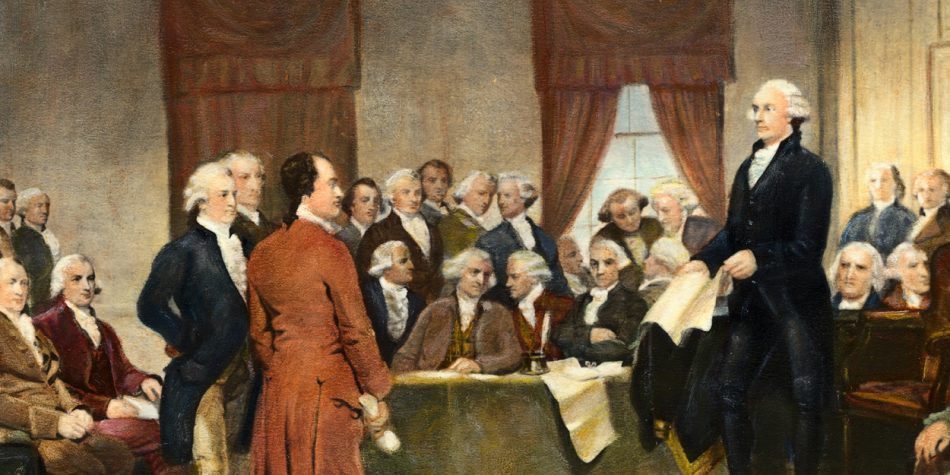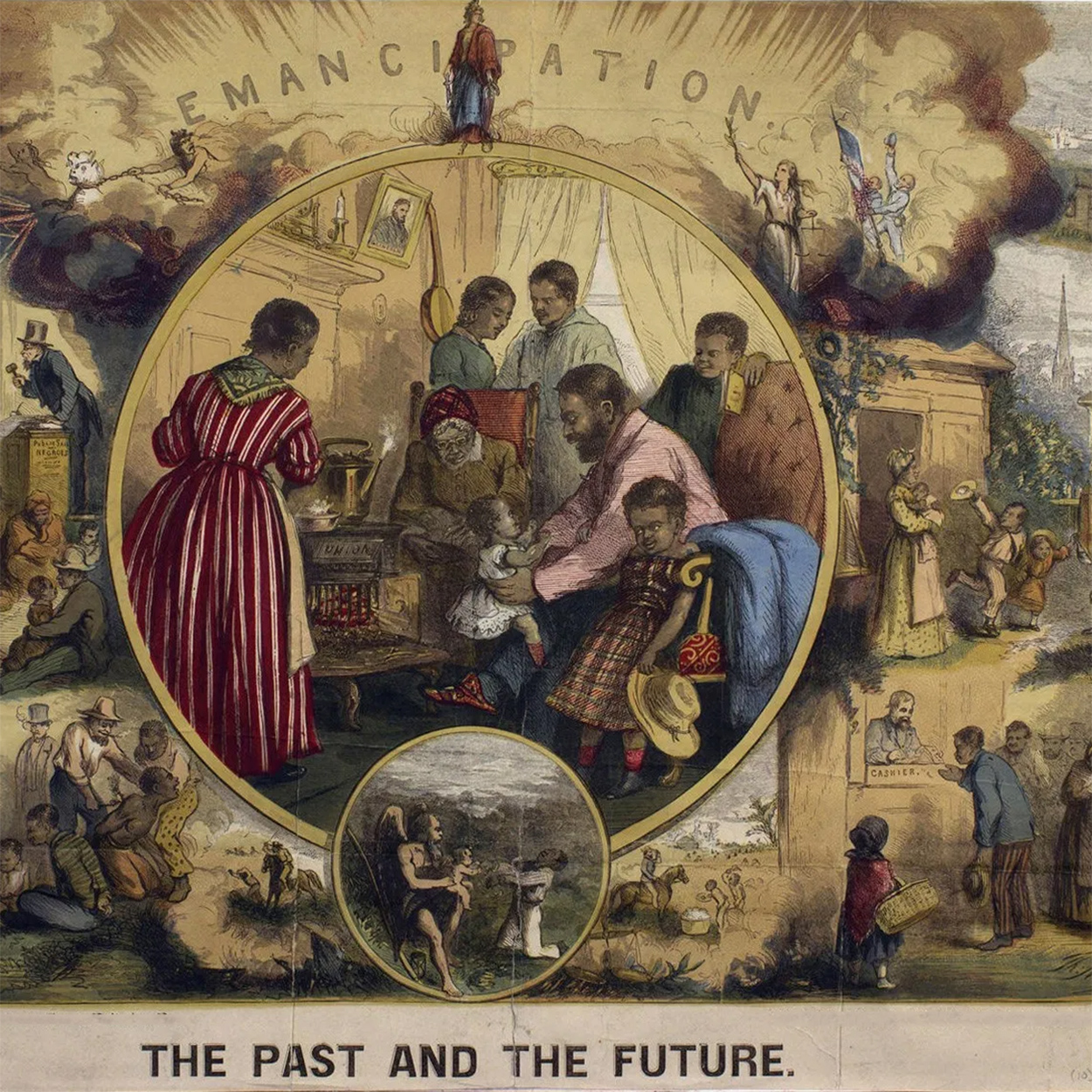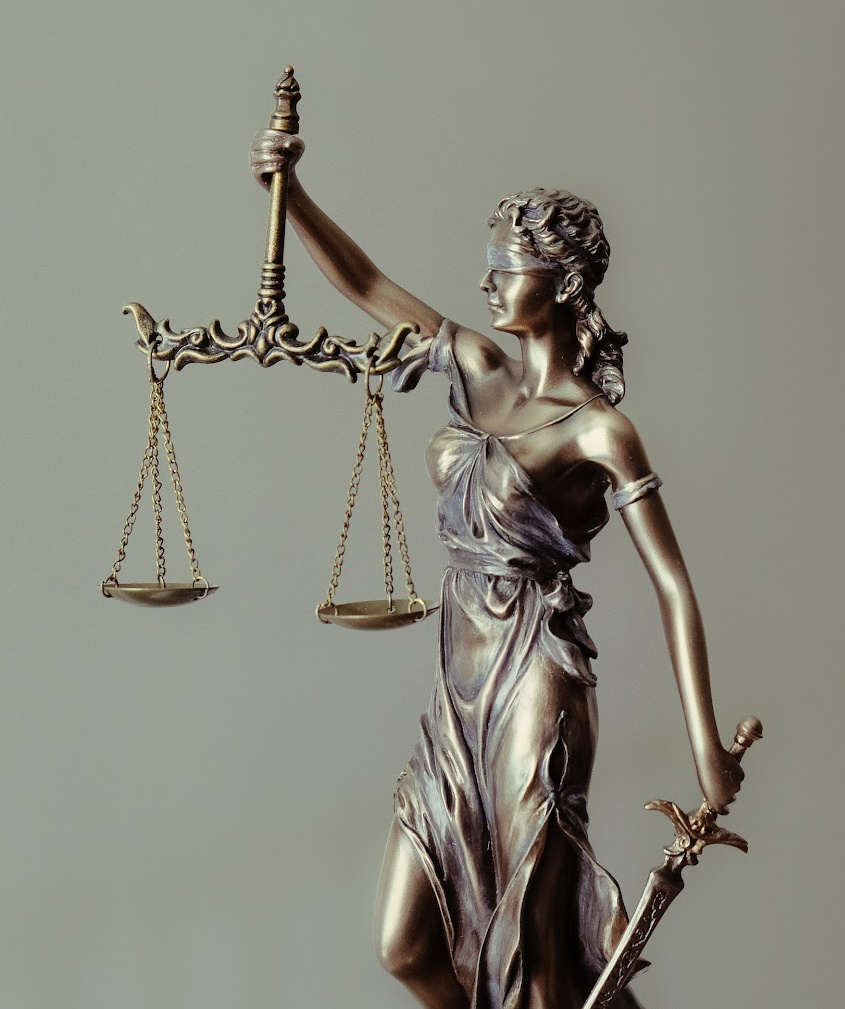Benjamin Franklin foreshadowed the struggles of government of the people, by the people, and for the people when he quipped that this was the distinctive approach of governing the Constitutional convention had given us, “if you can keep it.” Even more presciently and precisely, John Adams asserted that “our Constitution was made only for a moral and religious people. It is wholly inadequate to the government of any other.” A representative government inevitably mirrors the passions and prejudices, or aspirations and virtues of the governed—it, therefore, cannot possibly yield temperance, intelligence, or morality beyond that of its citizens. For this reason, both early and contemporary philosophers have reasoned that American society is kept in equilibrium by the social morality teachings found in religious faiths.
Make no mistake: though our Founders gave us their very best, they worshipped neither the free market nor the hand of government as the savior of society. Rather, they looked to God and the moral teachings of religion. Certainly, they understood the growth potential of capitalism within a government that secured and elevated individual freedom. But they relied on the social morality exemplified in Christ and intrinsic to Christian religion to first constrain and ultimately redirect the will to wealth and privilege and the will to power for the common good. With uncommon insight into human nature, the Founders directed their genius toward organizing political processes in a self-constraining system of mutual tug-of-war—a perpetual power struggle. In the marketplace, they relied on this same religiously-inspired social morality to temper and balance the law of the harvest with the responsibility to care for the poor. They knew, and forewarned, that unbridled avarice would erode social cohesion. Capitalism on its own is fueled by self-interest.
So, what is meant by this notion that our society can’t survive without religion and the sense of true social morality it engenders? We believe the moral influence of religion is the body politic’s immune response, the white blood cells that detect and subdue the epidemic excesses of unbridled capitalism and power politics that threaten our social health.
The Will to Wealth and Privilege
Capitalism, in its undiluted philosophical form, itself has no moral foundation per se, no constraints on its excesses which doom it to destruction. Capitalism is a secular, not spiritual invention, rooted in the idea that people are motivated by the law of the harvest, the right to the fruits of their labor. Untempered by religion’s promotion of empathy, filial fellowship, and social morality, capitalism sets up a shady shop, and legislatures and courts are forever just trying to ‘keep the fight fair’ between management and labor, shop owner and customer, one person and the next. The powerless and marginalized are forever vulnerable. Capitalism on its own is fueled by self-interest, Adam Smith’s “invisible hand” of greed. Personal profit—even when couched in global terms of economic growth—is the sole aim. Intemperate capitalism resists and eludes any restraint or regulation; it is economic Darwinism. Within capitalism itself, there is no self-regulating mechanism—it is inherently intemperate!
In a sense, then, capitalism is the economic model suited to a fallen world, harnessing and yoking us together in aspirational and consumptive greed—replacing the lash of the tyrant. Yet, the fuel of capitalism is itself the seed of its own demise, left to itself a suicide pact disguised as a promise of prosperity. Rather than uniting us, an amoral compact of self-interest divides us into competitive tribes on the savannah of life. Self-interest is a motivation for individual striving, but an aspiration for collective, social morality is required for societies to thrive. Unrefined capitalism is unconcerned with such economic externalities—human, social, or environmental impact—all these being merely instruments or impediments to profitability. Where the balance sheet is the only, myopic consideration, society consumes itself—its people, its social cohesion, its environment.
What is it then that curtails that risk? We would argue the success, survival, and longevity of capitalism depend on being wedded to and domesticated by religious teachings concerning the brotherhood and sisterhood of humankind and the norms, ideals, and inherent constraints of social morality that accompany this perspective. In the absence of this bedrock belief and action, capitalism is built on the tectonic fault line of greed and it gradually, inexorably, and inevitably comes seismically crashing down on itself. Except by virtue of the civilizing influence of religion, there is little in the nature of capitalism to tether and constrain its avarice and excess, beyond the threat of mutually assured destruction. Recognizing the indispensability of religion’s social morality to rescuing us from these excesses, the Founders sought to unequivocally secure religion’s place and protection in our society through the very First Amendment of the Bill of Rights!”
Religiously infused capitalism, which is what our nation has practiced and prospered by throughout its economic history, is an ‘enlightened capitalism, helping to direct each actor, as well as government as a whole, in curtailing capitalism’s exploitive inclinations that, unchecked, rend our social fabric. The social morality tied to religion offers capitalism a transformative rebirth. As religious practice matures in an individual or nation, its morality not only tempers but altogether removes these egregious excesses. From the beginning, our collective sense of social morality borne of religious belief is what has reformed and refined capitalistic practice, safeguarded against the worst paths to personal gain, and purged its excesses—though less and less today, at our increasing peril. Absent this sense, at its amoral extreme capitalism becomes immoral and criminal. Raw capitalism is ever on the prowl for an exploitive edge—even a rapacious path to greatest gain. As the influence of religion and its social morality is increasingly peripheralized, our peril increases.
Social morality arising from religious faith is like the tethering string on a kite, seemingly holding it back while in truth it all the while holds it up, steadying it and allowing it to rise on the winds of aspiration and ambition—both sailing with and tacking against greed. Without that influence, of course, the kite is simply blown about and crashes to the ground. The Founders’ urging upon us the social morality of religion reminds us to not let go of the string—it doesn’t hold back capitalism, it holds it up!
The Will to Power
In the political sphere, the Founders also recognized the danger in humankind’s natural will to power. Their protective plan pitted power against power in multiple ways. First, we have the check and balancing of state and federal governments. State and federal powers were carefully enumerated, balanced, and arrayed in tension and competition. However, even at that time, Alexander Hamilton presciently predicted that the federal government was very likely to become a central power overshadowing the states, using its purse strings to hogtie state and local governance. Choice creates competitive pressure among state governments.
The erosion of state power vis a vis the federal government, commenced, in no small part, during the Lincoln presidency, but accelerated dramatically during the FDR years of national economic depression. Expansion of federal power began through the Commerce Clause, but has since continued through an ever-enlarging and apparently limitless Constitutional “penumbra.” This ongoing expansion has deeply undermined the Founders’ careful design and balancing of state and federal power with its checks and balances and other intended benefits. Unfortunately, the strings tied to federal largesse often hamstring state governments and experimentation, centralizing power and governance and making states largely vassal states to the centralized federal “monarchy.” [Expansion of federal power through the Commerce Clause of the Constitution and through the elimination of state legislatures’ ability to check the federal legislature through their right to appoint their own U.S. senators have combined to severely dilute state autonomy and states’ capacity to check federal overreach, except through the courts, as is practiced increasingly today].
Next, the Founders introduced competitive, marketplace pressure on state governments as a means of incentivizing states to develop and sustain governmental “best practices.” Given that citizens (and their enterprises) were to have the right of free movement among the states, they could literally vote with their feet, as well as at the ballot box—something we have seen much of in recent years (e.g., small businesses fleeing California and New York for greener pastures) as well as historically.
Choice creates competitive pressure among state governments—mini laboratories of self-governance. Within Constitutional limits, quasi-independent state governments were to be free to innovate and experiment to attract inward migration of labor and capital and to promote a contented, prosperous, and free society. States could readily observe what was tried, what worked, and what didn’t and work to maintain their competitive edge. The competitive marketplace of state governance creates pressure for good governance while delivering competitive value and pricing (state taxes) to the citizens of our country.
Another source of designed tension was the strict separation of judicial, legislative, and executive powers within the federal government, together with the deployment of a structure of checks and balances enabling each branch to protect its turf, as needed. The Founders were counting on the will to power.
Currently, the executive branch is gathering up power being ceded by the legislative branch. The pendulum has swung round, at various times, among the branches, but currently, Congress seems all too amenable—the President and the newly coronated and increasingly autonomous administrative branch providing political cover to elected representatives through governance by bureaucratic rule-making and executive orders. The Founders may actually have failed to anticipate the surrender of public ambition to private ambition—that personal will to power (to remain in office) would erode an entire branch’s will to protect its power. The judicial branch, too, dabbles in both legislative and executive type activity, straying from strict interpretation and application of law. All of this circumvents the Founders’ careful Constitutional design.
Finally and ultimately, the Founders pitted the people against the excesses of government and the government against the excesses of mob majority rule. At the ballot box and through what has proven over time to be the vital protections of the Bill of Rights (our ‘don’t tread on me’ declaration of the fundamental territory and tools of our freedom), the people have their own legal “standing” against their government. The Bill of Rights was our fortification against direct invasions and incursions of government power on individuals and groups. Conversely, through the buffering of representative governance, the government is arrayed against the tyrannies of mob majorities. The common element of every provision in our Constitutional government is an Adam Smith-like reliance on another “invisible hand”—that each entity would act in its own political self-interest to protect its own power and privilege. Check and balance was found in pitting ambition against ambition. With each element of government watchful and wary of territorial encroachment, ambition was enlisted to check ambition, put to work to check itself. But even the Founders’ careful, systematic checks and balances haven’t stopped parties and individuals from successfully exploiting political power for their own gain.
The Founders did foresee, though, that there would certainly be unforeseen fallibility in their “best-laid plans,” and they would fall short. The will to power is, after all, like running water that always finds its way downhill. As with the economic system, the fallback position again is the morality of the people, both in and out of government. They understood that if the time ever came where citizens and politicians grew prosperous and indifferent, nothing could save the country from a slow demise.
The Will to Thrive
In the inspired founding of our nation, the Founders pitted power against power, greed against greed, and religious morality against the both of them—and they warned that without religion, our freedom, prosperity, and peace would not endure. How easy it is for enterprise to turn to avarice, for patriotic governance to turn to paternal tyranny. The social morality of religion is also vulnerable to the corrosive influence of human fallibility and corruption. Still, religious ideals, anchored and exemplified in their own founding figures, tenaciously persevere through the fog of human shortcomings. Only the persistent, tempering influence of indomitable religious ideals—the fellowship of humankind and social morality—prevents society from backsliding to oppression and predation.
Religion, therefore, not government or the free market, is the wellspring and protector of freedom, agency, equality, and prosperity. A core tenet of religious faith, the germinal seed of social morality, is the Parenthood of God and the corresponding brotherhood and sisterhood of all human beings. Here is a belief with the power to organize our relationships with the love borne of being “family.” Fully embraced, this conviction holds the potential of eclipsing and finally erasing our tribal tendencies—whether based on race, ethnicity, culture, nationality or any other category of difference.
The Founders’ work is a study in paradox, simultaneously pessimistic because of their view of human nature, yet hopeful because of religion’s tempering and refining influence. Aware of human nature, they sought by “cynical” preparations and provisions to help protect us against ourselves—at least long enough to return to our senses when consequences begin to pile up. They studied the scope of history and sought to give us a reason for hope against the excesses that would be our natural inclinations, likely to play out in our economic and political choices.
Given all they saw across the scope of human history, and all they could foresee, the Founders approached the establishment of our nation with a dose of skepticism and in their precautions found hope—taking every measure to grant us liberty and help us keep it by squarely facing up to our individual and collective corruptibility. Paradoxically, their optimism came in part from acting on their pessimism for our protection. Ultimately though, and through it all, they saw our aspirational religion—a fully realized religion, not one modeled to indulge and justify our moral weaknesses or corruptions—as our true and lasting source of hope and possibility.
It is truly ironic that the genius of America’s founding arose from the Founders’ less than beatific, indeed pessimistic awareness of and attention to our inherent corruptibility—both political and economic. The paradox of their founding work is that in their attention to and provision of protections against human corruptibility and in their promotion of religion as foundational to the republic, they gave us a basis for hope and a context for striving for the better angels of our divine nature. When it came to human nature, the Founders saw the pervasiveness and contested actions of our mortal–spiritual dualism across the panorama of human history and learned from it, hoping to help us not repeat it. This fundamental and overarching view of human nature informed every particular of their Constitutional and economic design. And the context for corralling and working out our aspirational vision was to be the combination of all their designed Constitutional constraints, and the foundational social morality of religious faith—an embedded belief in a higher power and higher priorities for humankind. Religion, therefore, not government or the free market, is the wellspring and protector of freedom.
While the marketplace and the public square always held the potential of bringing out the worst of human nature, religion would have the duty to tame these impulses and fashion reins of restraint through a shared social morality ethos springing from an ever-present mindfulness that “all human beings are created in the image of God,” reflecting a universal family connection, and accountability to God for our conduct in relation to one another.
For the Founders, the aspirational vision springing from religious teaching of the family and fellowship of humankind, of love for one another, and of action giving expression to these beliefs, was their final safeguard of our highest hopes. All their other careful designs were but safety net and scaffolding, yet this last and ultimate safeguard was one that only we ourselves could put in place. Only our will to the social morality of this shared faith could help us overcome our natural will to power, wealth, and pleasure and transform us into a nation of community, citizenship, and true social justice. In their minds, our ultimate potential as individuals, communities, and as a nation was to be found first in the bridling of our natural passions and then ultimately in their transformation. Religion was to be at first the reins upon our tribalistic tendencies and ultimately our liberation from them. That we have fallen woefully short of the ideals of human family and social morality borne of these principles of religious faith is abundantly clear. That we must reckon with this reality or lose our nation and our freedom is increasingly evident. That we can repent, forgive, and transform our nation through transforming ourselves, thereby preserving the design of our guiding institutions, and renewing our unifying belief in our human family is our only hope.

















